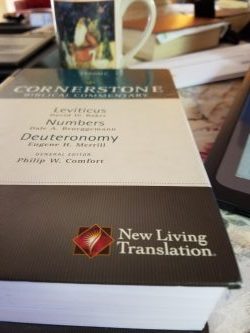Bibles: Turning a Blessing into a Curse
I have blogged a number of times on the benefits of having multiple English Bible versions to use in Bible study, especially for the student who does not know Biblical languages. I did so most recently in my post From Word to Study, in my series on word studies.
Yesterday I got an e-mailed link to a blog post titled all these translations, arrgh in e-mail in which the writer narrated a journey through confusion to some sort of solid ground with reference to Bible study. It’s not his conclusion that causes me to disagree, but rather the fact that he and so many others have to go through such a journey. I do disagree with his preference for formal equivalence versions for study, but that’s another topic. Others may be less careful than he was and get stuck in some very dangerous places.
Why is it that the blessing of having the Bible readily available in English can so often be turned into a curse. Here are some of the common complaints I hear:
- I can’t follow the pastor’s scripture reading. It’s not the same as in my Bible.
- I like the rich language of the KJV
- The differences in versions causes confusion. Nobody knows what to believe.
- There are missing/added passages in that Bible!
How do we respond to this? Well, it’s valuable to educate people on the process of translation and the reasons why translations differ. I try to do this in my book What’s in a Version?, which is actually simply the lesson materials for a seminar I’ve taught several times. I’m looking at extracting from this a shorter version titled “Choosing a Bible” with additional material on choosing Bibles with study notes, and then expanding the current book, which only has a couple of paragraphs on the major issue of gender language, for example. Such education is good, and of course I like to sell books! 🙂
But let’s look at these objections and some things we can do to help people understand through what we do in church, Sunday School, and other such studies on a daily basis.
- Have a pew Bible.
We like people to bring their Bibles to church, but the one way to be sure everyone can read together is through use of a pew Bible. Then identify the translation you’re using and let the congregation know that it is in the same version as the one in their pew. This can also help with unison reading and responsive reading. People can still choose to use their own Bibles, but then they’re on their own. Consider also preaching about Bibles, and perhaps also sponsor a missionary who is translating the Bible. Bring your missionary to the church to speak. - It may be difficult to deal with the “rich language” issue. In some churches, the answer may be a Bible that has more majestic language, though in modern English, such as the REB or the NJB. In other cases you may simply have to explain to some members that in order to reach the unchurched who don’t understand “churchy” language, you’re reading from a more modern version. To those who love the KJV, I suggest setting up a small study group of those who are of like mind, and using the KJV in your group. This will have the added advantage of adding a Bible study event to your week.
- Differences in Bible translations are generally only a major problem to those who use the proof text method. The best answer to this is to train your congregation (whether you are a pastor or other leader) in how to study and to lead them to base their beliefs on a broader range of scriptures and a more secure foundation of interpretation.
- It’s a bit more difficult to deal with the whole passage differences simply because you need to deal with how texts are copied, but again, educating people to broaden their scriptural base will help, because no major doctrines are based solely on disputed passages. Education and study are still the key.
More important than any of the specifics is to constantly celebrate the availability of the scriptures in your teaching, preaching, and in your daily life. Be aware that even very good technical criticism can drive people from the Bible. My own dislike for the Living Bible had to be sidelined just a bit when I found that it was the first Bible my wife had read, and resulted in her coming to the Lord. What if someone had gotten to her first with a charge of corruption? Criticism of Bible versions is healthy, and often required. There is no Bible version that cannot be justifiably criticized. But such criticism should always be put into context.
The abundance of Bibles is a blessing–let’s strive to keep it that way!

